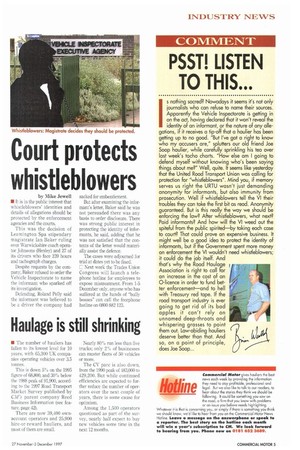Court protects whistleblowers
Page 7

If you've noticed an error in this article please click here to report it so we can fix it.
by Mike Jewell
• It is in the public interest that whistleblowers' identities and details of allegations should be protected by the enforcement agencies and the courts.
This was the decision of Leamington Spa stipendary magistrate Ian Baker ruling over Wanvickshire coach operator Johnsons (Henley) and 27 of its drivers who face 239 hours and tachograph charges.
Despite requests by the company, Baker refused to order the Vehicle Inspectorate to name the informant who sparked off its investigation.
Defending, Roland Pelly said the informant was believed to be a driver the company had sacked for embezzlement.
But after examining the informant's letter, Baker said he was not persuaded there was any basis to order disclosure. There was strong public interest in protecting the identity of informants, he said, adding that he was not satisfied that the contents of the letter would materially assist the defence.
The cases were adjourned for trial at dates yet to be fixed.
7 Next week the Trades Union Congress will launch a telephone hotline for employees to expose mistreatment. From 1-5 December only, anyone who has suffered at the hands of "bully bosses" can call the freephone hotline on 0800 882 123.








































































































